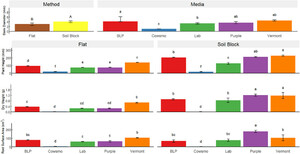USA
March 3, 2025

Pepper growth parameters when grown in flats, soil blocks, and with five different growing media in the Iowa State University Horticulture greenhouse in Ames, IA in 2022.
Ames, IA— Two recent studies by the University of Iowa highlight advancements in sustainable agriculture, focusing on methods to enhance lettuce freeze tolerance and improve organic vegetable transplant production. These findings provide growers with practical solutions to increase crop resilience and efficiency.
The first study investigates the use of salicylic acid, ascorbic acid, and calcium chloride to improve the freeze tolerance of field-grown lettuce. These treatments help protect lettuce from cold stress, reducing damage and increasing yield during periods of unexpected low temperatures. By leveraging these compounds, growers can extend the growing season and ensure crop reliability in changing climates.
Researchers found that optimizing the concentrations and timing of chemical treatments is key to enhancing freeze tolerance.
The second study evaluates the effectiveness of the soil block method and different growing media in organic vegetable transplant production. Soil blocks eliminate the need for plastic containers, aligning with organic principles and reducing waste. The research identifies optimal growing media that support healthy root systems and vigorous transplants, ensuring successful establishment in the field.
Researchers discovered that selecting the right growing media is critical for producing high–quality transplants using the soil block method.
Both studies stress the importance of care management and planning to maximize benefits, and illustrate how precision in farming practices can lead to significant improvements in outcomes.Together, these studies contribute to the ongoing effort to develop sustainable, resilient agricultural practices.
Ajay Nair is a Professor and Department Chair of the Department of Horticulture at Iowa State University. As a primarily Extension-based faculty member, Dr. Nair has interacted with countless growers and community members across the state, leading on-farm demonstrations at grower plots, field experiments at Iowa State facilities and organizing various workshops and outreach events. He also serves as principal investigator of the Sustainable Vegetable Production lab, which aims to enhance crop production, soil health and cropping system profitability for vegetable production in Iowa.
The full stories can be found on the ASHS HortScience electronic journal website at: https://doi.org/10.21273/HORTSCI17283-23 and https://doi.org/10.21273/HORTSCI17566-23